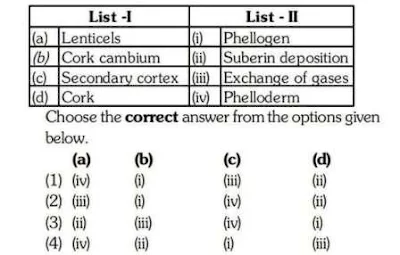1. Which of the following is a correct
sequence of steps in a PCR (Polymerase Chain Reaction)?
(1) Denaturation, Annealing, Extension
(2) Denaturation, Extension, Annealing
(3) Extension, Denaturation, Annealing
(4) Annealing, Denaturation, Extension
2. Which of the following is not an
application of PCR (Polymerase Chain Reaction)?
(1) Molecular diagnosis
(2) Gene amplification
(3) Purification of isolated protein
(4) Detection of gene mutation
3. DNA strands on a gel stained with ethidium
bromide when viewed under UV radiation, appear as
(1) Yellow bands
(2) Bright orange bands
(3) Dark red bands
(4) Bright blue bands
4. When the centromere is situated in the
middle of two equal arms of chromosomes, the chromosome is referred as
(1) Metacentric (2) Telocentric (3) Sub-metacentric (4)
Acrocentric
5.Genera like Selaginella and Salvinia produce
two kinds of spores. Such plants are known as :
(1) Homosorus (2) Heterosorus (3)
Homosporous (4) Heterosporous
6. Which of the following are not secondary
metabolites in plants?
(1) Morphine, codeine (2) Amino acids, glucose (3)
Vinblastin, curcumin (4) Rubber, gums
7. Plants follow different pathways in
response to environment or phases of life to fom different kinds of structures.
This ability is called:
(1) Elasticity (2) Flexibility (3) Plasticity (4) Maturity
8. The factor that leads to Founder effect in
a population is:
(1) Natural selection (2) Genetic
recombination (3) Mutation (4) Genetic
drift
9. When gene targeting involving gene amplification is attempted
in an individual's tissue to treat disease, it is known as :
(1) Biopiracy (2) Gene therapy (3)
Molecular diagnosis (4) Safety testing
10. The term used for transfer of pollen grains from anthers of
one plant to stigma of a different plant which, during pollination, brings
genetically different types of pollen grains to stigma, is
(1) Xenogamy (2)
Geitonogamy (3) Chasmogamy (4)
Cleistogamy
11. Which of the following algae contains mannitol as reserve food
material?
1) Ectocarpus 2) Gracilaria
3) Volvox
4) Ulothrix
12. A typical angiosperm embryo sac at maturity is :
(1) 8-nucleate and 7-celled (2) 7-nucleate and 8-celled
(3) 7-nucleate and 7-celled (4) 8-nucleate and 8-celled
13. Which of the following is an incorrect statement?
(1) Mature sieve tube elements possess a conspicuous
nucleus and usual cytoplasmic organelles.
(2) Microbodies are present both in plant and animal
cells
(3) The perinuclear space forms a barrier between the
materials present inside the nucleus and that of the cytoplasm.
(4) Nuclear pores act as passages for proteins and RNA
molecules in both directions between nucleus and cytoplasm.
14. Amensalism can be represented as:
(1) Species A (-); Species B (0) (2) Species A (+); Species B (+)
(3) Species A (-); Species B(-) (4) Species A (+); Species B (0)
15. The first stable product of C02 fixation in sorghum is
(1) Pyruvic acid (2) Oxaloacetic acid (3) Succinic acid (4)
Phosphoglyceric acid
16. Which of the following algae produce Carageen?
(1) Green algae (2) Brown algae (3) Red algae (4) Blue-green
algae
17. In the equation GPP-R= NPP, R represents:
(1) Radiant energy (2) Retardation factor (3) Environment factor (4) Respiration losses
18. Which of the following statements is not correct?
(1) Pyramid of biomass in sea is generally inverted.
(2) Pyramid of biomass in sea is generally upright.
(3) Pyramid of energy is always upright.
(4) Pyramid of numbers in a grassland ecosystem is upright.
19. Mutations in plant cells can be induced by:
(1) Kinetin (2) Infrared rays (3) Gamma
rays (4) Zeatin
20. The amount of nutrients, such as carbon, nitrogen, phosphorus
and calcium present in the soil at any given time, is referred as:
(1) Climax (2) Climax community (3)
Standing state (4) Standing crop
21. Match the following
22. Match the following
24. Match the following

25. Match the following
Answers
1. (1) Denaturation, Annealing, Extension
2. (3) Purification of isolated protein
3. (2) Bright orange bands
4. (1) Metacentric
5. (4) Heterosporous
6. (2) Amino acids, glucose
7. (3) Plasticity
8. (4) Genetic drift
9. (2) Gene therapy
10. (4) Cleistogamy
11. 1) Ectocarpus
12. (1) 8-nucleate and 7-celled
13. (1) Mature sieve tube elements possess a conspicuous nucleus and usual cytoplasmic organelles.
14. (1) Species A (-); Species B
15. (2) Oxaloacetic acid
16. 3) Red algae
17. (4) Respiration losses
18. (2) Pyramid of biomass in sea is generally upright.
19. (3) Gamma rays
20. (4) Standing crop
21. (2)
22. (2)
23. (3)
24. (1)
25. (1)




